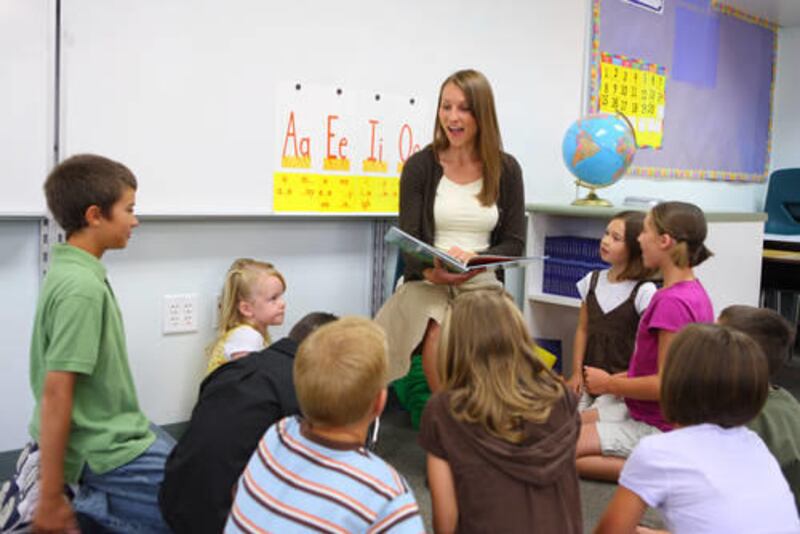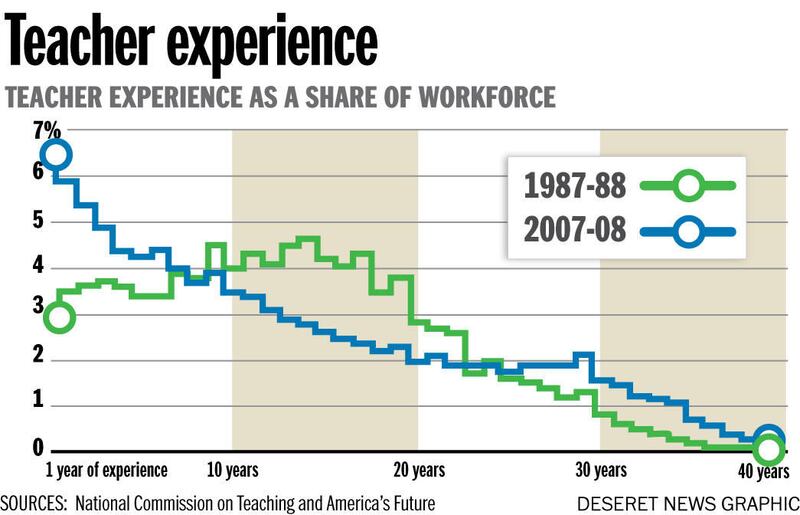Many researchers agree that teaching experience matters, yet children today are more likely to encounter a teacher with far less experience than the teacher they most likely would have had 10 years ago, according to an article at MSNBC.com.
In 1987-88, about 4.5 percent of public school teachers had 15 years of experience, the most common level of time logged in the classroom. In 2007-08, the most common level of experience was one years, with about 6.5 percent of teachers falling in that category.
More than 11 percent of teachers were in their first two years, according to a graph that accompanied the story.
The reasons for such a dramatic shift varies. Baby boomers are retiring — between 2004 and 2008, 300,000 veteran teachers left the profession, nearly 10 percent of all public school teachers, according to report conducted by the National Commission on Teaching and America's Future (NCTAF). Teachers are also facing more pressure than they have in the past and are leaving the profession early on — nearly 50 percent of new teachers leave within their first five years of teaching, MSNBC reported. And with the low pay, a bleak economy and negative stigma surrounding teaching, fewer people are pursuing a teaching degree.
"Out of the most popular fields in college, only two have gone down in the number of graduating students over the last 10 years. One is computer and information sciences. The other is education," the Deseret News reported earlier this year.
Yet studies show that students perform better when their teacher has been in the classroom longer, up to a certain extent.
Parents Across America cited several studies in a recent post about how "the only two observable factors that have been found consistently to lead to higher student achievement are class size and teacher experience."
The author of the post claims that teaching experience matters each year up to 15 to 20 years, citing studies conducted in Tennessee and Florida.
NCTAF found a similar phenomenon, but say the gains can really be seen up to the first seven years. Yet the group cites studies that say teacher effectiveness improves up to 11 years and another that says up to 20 years.
Traditionally, the teaching profession guarded against getting rid of teachers with seniority, but many said this punished those new in the field. Recently, though, there has been more talk about being able to fire long-standing teachers more easily.
"Lawmakers passed legislation this year in Florida, Georgia, Idaho, Illinois, Indiana, Nevada, Ohio and Utah that ended layoff policies based only on seniority," reported the Globe Gazette based in Mason City, Iowa, on Saturday.
Yet the media outlet also found that Minnesota, California and Kentucky "prohibit school districts from considering any other factor when making layoff decisions."
While states are still tweaking best practices in firing a teacher, they also need to be focusing on best recruitment techniques, says the NCTAF.
In the next few years, U.S. schools will need 1.6 million new teachers, the Bureau of Labor Statistics told MSNBC.
"The crisis is upon us," Brad Jupp, a senior program adviser on teacher effectiveness and quality at the U.S. Department of Education, told MSNBC. "The mode of experience being one to two years should be the most alarming thing we have come upon."
But the answer may not be just recruiting new teachers.
"The current structure assumes a continual influx of new teachers with little attention given to who is placed where and what is needed for teaching to succeed in a particular environment," the NCTAF wrote in its report. "This results in young, inexperienced teachers often facing assignments in the most challenging schools because that is where the openings are — but with little support, they burn out in a few years, feeding the churn of attrition and teacher turnover in these schools."
Some of the other suggestions from NCTAF include revamping the teacher retirement system, preparing for the future by studying what kind of effects teacher retirement and inexperienced teachers may have in a state and encouraging effective veteran teachers to take on leadership roles in their schools.
"Just because somebody has time in the classroom doesn't mean they are an excellent teacher. I think that's obvious," Victoria Robinson, a professor of educational leadership at the University of Northern Iowa, told the Globe Gazette.
"But I also think that there is a value to experience, and there is no way to negate the rich experience that our veteran teachers have. Experience often makes teachers better than they were."
EMAIL: slenz@desnews.com



